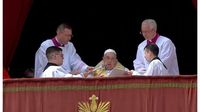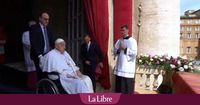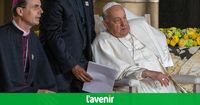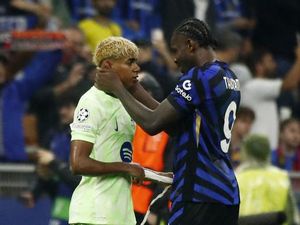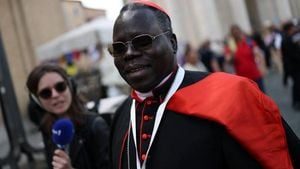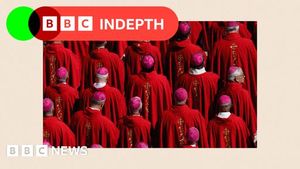On April 20, 2025, Pope Francis made a brief but significant appearance at St. Peter's Basilica, delivering the traditional "Urbi et Orbi" blessing on Easter Sunday. This moment was particularly poignant as the 88-year-old pontiff, still recovering from a serious pneumonia, appeared in a wheelchair, without the nasal cannulas that had been a necessity during his hospitalization.
The Pope's presence was uncertain until the last moment, but he emerged shortly after 12:00 PM local time (10:00 GMT) to greet thousands of faithful gathered in St. Peter's Square for the most important celebration in the Christian calendar. "Happy Easter!" he exclaimed to the crowd, which had swelled in anticipation, especially given the significance of the Jubilee 2025.
Despite his frail condition, Pope Francis managed to convey a message of hope and peace, although he struggled to speak due to his weakened state. He delegated the reading of his text to a collaborator, who recounted the various conflicts plaguing the world. Among the issues highlighted was the "dramatic and ignoble humanitarian situation" in Gaza, where the Pope called for an end to hostilities and emphasized the need for humanitarian aid. "I call on the belligerents: cease fire, let the hostages be released, and provide precious aid to the starving population that longs for a future of peace," he urged.
Earlier that day, the Pope had met privately with U.S. Vice President J.D. Vance for a brief discussion at the Vatican's Sainte-Marthe residence. This meeting came two months after the Pope had openly criticized the immigration policies of the Trump administration, emphasizing the ongoing tension between the Vatican and the U.S. political landscape.
This Easter Sunday marked a notable departure from tradition for Pope Francis, as he missed most of the Holy Week appointments for the first time since his election in 2013. His absence was felt during the Stations of the Cross at the Colosseum and the Easter Vigil, which he delegated to cardinals. Nevertheless, he made a brief appearance on Saturday afternoon, praying before an icon of the Virgin Mary and interacting with children, which brought smiles to the faces of the faithful.
The Easter Mass itself commenced at 8:30 AM GMT, presided over by Cardinal Angelo Comastri, and was attended by approximately 300 priests, bishops, and cardinals. The square was adorned with thousands of Dutch flowers, creating a vibrant backdrop for the celebration. Organizers had anticipated an especially large crowd due to the Jubilee, which occurs every 25 years and draws millions of pilgrims to the Eternal City.
The Pope's remarks during the "Urbi et Orbi" blessing were broadcast worldwide, reaching millions who tuned in to hear his message of peace and solidarity. His concerns regarding global conflicts resonated deeply, particularly in light of the ongoing crisis in Gaza and the rising tide of anti-Semitism globally. The Pope's call for peace and humanitarian assistance was a reminder of the Church's commitment to social justice and compassion.
As he addressed the faithful, the Pope's frailty was evident, yet his spirit remained unbroken. His presence at the balcony of St. Peter's Basilica was not just a personal triumph over illness but a symbol of hope for many who look to him for guidance and inspiration. The Pope's ability to connect with the crowd, even in his weakened state, showcased his enduring commitment to his role as a spiritual leader.
The event was a blend of solemnity and celebration, reflecting the dual nature of Easter as both a time of mourning and a time of joy. The Pope's message emphasized the importance of community and the need for collective action in addressing the world's challenges.
In the days leading up to Easter, the Vatican had been abuzz with preparations, and the expectation among the faithful was palpable. The Pope's health had been a topic of concern, with many wondering if he would be able to fulfill his traditional duties. His appearance on Easter Sunday was thus met with relief and joy, as the faithful expressed their support and love for their leader.
As the Pope concluded his remarks, the crowd erupted in applause, a testament to the bond between the pontiff and the people. This Easter, while marked by challenges, also served as a reminder of resilience and faith in the face of adversity.
Looking ahead, the Pope's health will continue to be monitored closely, and his future engagements will likely be adjusted to accommodate his recovery. Nevertheless, his commitment to addressing pressing global issues remains strong, and his voice will continue to be a beacon of hope for many around the world.
In the wake of his Easter message, the Pope's call for peace and humanitarian aid will echo in hearts and minds as communities around the globe reflect on the meaning of Easter and the importance of compassion in a world often divided by conflict.
